新版新世纪英语八年级上册知识点整理
八年级上册英语知识点归纳整理
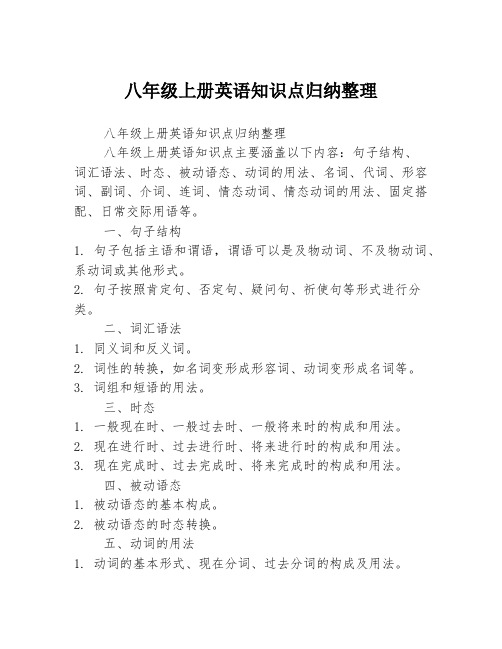
八年级上册英语知识点归纳整理八年级上册英语知识点归纳整理八年级上册英语知识点主要涵盖以下内容:句子结构、词汇语法、时态、被动语态、动词的用法、名词、代词、形容词、副词、介词、连词、情态动词、情态动词的用法、固定搭配、日常交际用语等。
一、句子结构1. 句子包括主语和谓语,谓语可以是及物动词、不及物动词、系动词或其他形式。
2. 句子按照肯定句、否定句、疑问句、祈使句等形式进行分类。
二、词汇语法1. 同义词和反义词。
2. 词性的转换,如名词变形成形容词、动词变形成名词等。
3. 词组和短语的用法。
三、时态1. 一般现在时、一般过去时、一般将来时的构成和用法。
2. 现在进行时、过去进行时、将来进行时的构成和用法。
3. 现在完成时、过去完成时、将来完成时的构成和用法。
四、被动语态1. 被动语态的基本构成。
2. 被动语态的时态转换。
五、动词的用法1. 动词的基本形式、现在分词、过去分词的构成及用法。
2. 动词的逻辑主语和关系代词。
六、名词1. 单数名词和复数名词的区别,复数名词的构成规则。
2. 可数名词和不可数名词的区别。
七、代词1. 人称代词、物主代词、反身代词的用法。
2. 指示代词、不定代词的用法。
八、形容词1. 形容词的一般用法。
2. 最高级和比较级形容词的构成和用法。
九、副词1. 副词的一般用法。
2. 最高级和比较级副词的构成和用法。
十、介词1. 常见的介词及其用法。
十一、连词1. 常见的连词及其用法。
十二、情态动词1. can、could、may、might、shall、should、will、would、must、need等情态动词的用法。
十三、情态动词的用法1. 表示能力、可能性、许可、请求、建议、必须等。
2. 情态动词表将来时态的用法。
十四、固定搭配1. 常见的固定搭配及其用法。
十五、日常交际用语1. 日常交际中常用的问候语、道歉、表示感谢等用语。
以上为八年级上册英语知识点的归纳整理,涵盖了语法、词汇、句型、语用等多个方面的内容。
新世纪版八年级上英语常用语法知识——并列复合句(含答案解析)
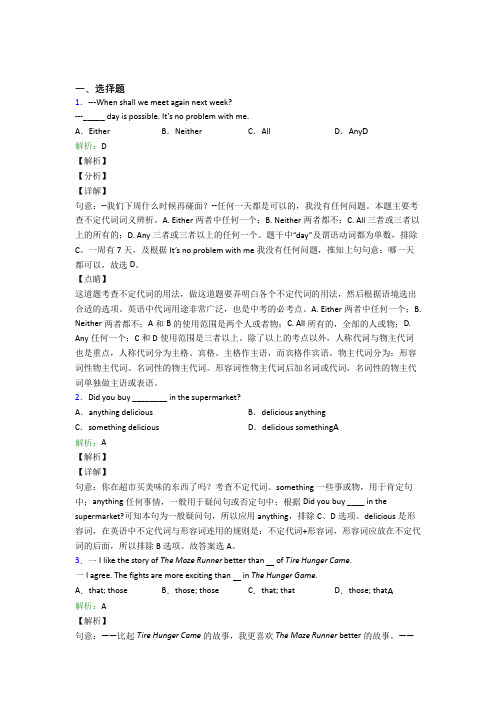
一、选择题1.---When shall we meet again next week?---_____ day is possible. It’s no problem with me.A.Either B.Neither C.All D.Any D解析:D【解析】【分析】【详解】句意:--我们下周什么时候再碰面?--任何一天都是可以的,我没有任何问题。
本题主要考查不定代词词义辨析。
A. Either两者中任何一个;B. Neither两者都不;C. All 三者或三者以上的所有的;D. Any三者或三者以上的任何一个。
题干中“day”及谓语动词都为单数,排除C。
一周有7天,及根据It’s no problem with me我没有任何问题,推知上句句意:哪一天都可以,故选D。
【点睛】这道题考查不定代词的用法,做这道题要弄明白各个不定代词的用法,然后根据语境选出合适的选项。
英语中代词用途非常广泛,也是中考的必考点。
A. Either两者中任何一个;B. Neither两者都不;A和B的使用范围是两个人或者物;C. All所有的,全部的人或物;D. Any任何一个;C和D使用范围是三者以上。
除了以上的考点以外,人称代词与物主代词也是重点,人称代词分为主格、宾格。
主格作主语,而宾格作宾语。
物主代词分为:形容词性物主代词、名词性的物主代词。
形容词性物主代词后加名词或代词,名词性的物主代词单独做主语或表语。
2.Did you buy ________ in the supermarket?A.anything delicious B.delicious anythingC.something delicious D.delicious something A解析:A【解析】【详解】句意:你在超市买美味的东西了吗?考查不定代词。
something一些事或物,用于肯定句中;anything任何事情,一般用于疑问句或否定句中;根据Did you buy ____ in the supermarket?可知本句为一般疑问句,所以应用anything,排除C、D选项。
新世纪版八年级上英语常用语法知识——特殊句式(含答案解析)

一、选择题1.______was in 1997_____I graduated from the university.A.That, that B.It, that C.That, when D.It,when B解析:B【解析】【详解】句意:我是在1997年从大学毕业的。
考查强调句,强调句句型“it is+强调部分+that/who+其他”,当强调部分是人时,也可以用who,故选:B。
2.—I haven’t seen the movie Hero Is Back—______________. Let’s go to see it together this Sunday.A.Me, too. B.Me neither. C.Yes, please.B解析:B【解析】【分析】【详解】句意:---我没看过电影《英雄回来了》。
---我也是。
这个星期天让我们一起去看吧。
考查情景交际。
A. Me, too.我也是。
当对方说“做某事”,如果你也做相同的事,就说“Me, too.”;B. Me neither.我也没做过某事。
当对方说“没做过某事”,如果你也没做过相同的事,就说“Me neither.”;C. Yes, please. 是的请。
别人请求你的允许时,你同意时说Yes, please.例如,问需不需要他的帮助或者服务之类的。
根据下文“这个星期天让我们一起去看吧。
”可知“我也没看过。
”可知填Me neither.;选B。
3.﹣Who found the lost sheep?﹣Tim and Tom______.A.finded it.B.were found C.did D.found C解析:C【解析】【详解】句意“-谁发现了丢失的羊?-蒂姆和汤姆发现的”。
根据found可知,用一般过去时,find的过去时是found,排除A;主语Tim and Tom与谓语动词之间为主动,排除B;found后要加宾语,而空后没有宾语,排除D;本题中用did代替found the lost sheep,故选C。
新世纪英语八年级上U1L1词汇
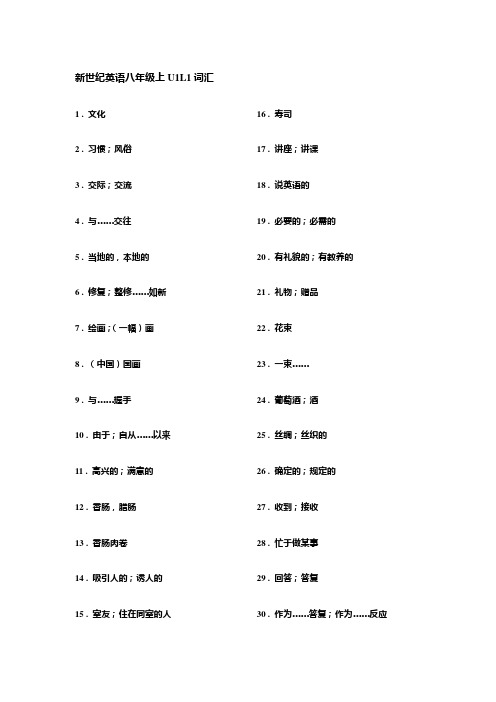
新世纪英语八年级上U1L1词汇1 . 文化2 . 习惯;风俗3 . 交际;交流4 . 与……交往5 . 当地的,本地的6 . 修复;整修……如新7 . 绘画;(一幅)画8 . (中国)国画9 . 与……握手10 . 由于;自从……以来11 . 高兴的;满意的12 . 香肠,腊肠13 . 香肠肉卷14 . 吸引人的;诱人的15 . 室友;住在同室的人16 . 寿司17 . 讲座;讲课18 . 说英语的19 . 必要的;必需的20 . 有礼貌的;有教养的21 . 礼物;赠品22 . 花束23 . 一束……24 . 葡萄酒;酒25 . 丝绸;丝织的26 . 确定的;规定的27 . 收到;接收28 . 忙于做某事29 . 回答;答复30 . 作为……答复;作为……反应新世纪英语八年级上U1L2词汇31 . 对……提出忠告;小费32 . 短途旅游;郊游33 . 去郊游;去远足34 . 道歉35 .粘住;堵塞36 . 卡在……;陷在……37 . 车费;船费38 . 便士39 . 女侍者;女服务员40 . 帐单;票据41 . 服务;服务性事业42 . 费用;收费43 . 服务费44 . 更糟的是45 . 丝毫;根本46 . 期待;盼望47 . 平均;平均的48 . 发票;收据49 . 可怕的;非常50 . 词典;字典51 . 电子词典52 . 录制品;录音带53 . 服务性行业54 . 工资;工钱55 . 加拿大人;加拿大(人)的56 . 厅;沙龙57 . 美发厅58 . 对……感到满意59 . 不高兴的;不满意的60 . 对……感到不满意61 . (行李)搬运工62 . (旅行用)小提箱;衣箱63 . 服务员;侍者64 . 男侍者,男服务员65 . 支票;检查66 . 在饭店吃饭67 . 菜单68 . 第一道菜69 . 汤,羹70 . 洋葱71 . 主菜72 . 牛排73 . 特色菜;特产74 . 甜食;甜点心75 . 矿物的;矿物76 . 矿泉水77 . 雪碧78 . 荷兰(人)的;各自付费79 . 各人付各人的帐80 . 请(客);医治81 . 如此……以至82 . 感谢的,感激的83 . 对某人表示感激84 . 用……招待某人85 . 请某人点菜86 . 半熟的;稀有的87 . 熟透的;烧得烂的88 . 最少的;最少89 . 至少;起码90 . 豌豆91 . 把……捣成糊状92 . 土豆泥93 . 越来越(多的)94 . 包装;打包95 . 快餐;点心96 . 快餐部;点心店97 . 链条;连锁店98 . 例如;诸如……之类99 . 肯德基炸鸡店100 . 麦当劳快餐店101 . 必胜客比萨饼店102 . 要求;需要103 . 下面;下列104 . 介绍;引言105 . ……的介绍;……入门106 . 完整的;完成107 . 套餐108 . 软饮料,不含酒精的饮料109 . 热狗1 . 共同的;普通的2 . 成语;习语3 . 身体;尸体4 . 部分5 . 人体部位6 . 拇指7 . 注意地;专心地8 . 认真地;严肃地9 . 园艺10 . 与某人看法一致11 . 园艺技能12 . 全神贯注地听,洗耳恭听13 . 指甲;钉子14 . 击中要害;一针见血15 . 一……就……16 . 在……的帮助下;借助于……17 . 表达;陈述18 . 生动地;逼真地19 . 笑话;玩笑20 . 对不起;原谅21 . 独立的;自立的22 . 记住;默记23 . 笨拙的24 . 背诵;朗诵25 . 手势;用手势表示26 . 点头;点头表示27 . 索引;编索引28 . 食指29 . 嘴唇30 . 安静一点31 . 烦恼;故障32 . 圆;环形物33 . 大众化的;流行的34 . 作为;当作35 . 南美洲的;南美洲人36 . 侮辱;辱骂37 . 轻打。
英语八年级上册重点知识归纳
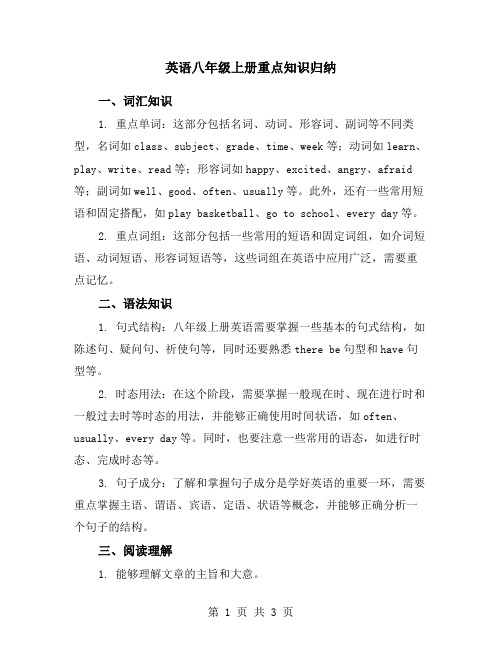
英语八年级上册重点知识归纳一、词汇知识1. 重点单词:这部分包括名词、动词、形容词、副词等不同类型,名词如class、subject、grade、time、week等;动词如learn、play、write、read等;形容词如happy、excited、angry、afraid 等;副词如well、good、often、usually等。
此外,还有一些常用短语和固定搭配,如play basketball、go to school、every day等。
2. 重点词组:这部分包括一些常用的短语和固定词组,如介词短语、动词短语、形容词短语等,这些词组在英语中应用广泛,需要重点记忆。
二、语法知识1. 句式结构:八年级上册英语需要掌握一些基本的句式结构,如陈述句、疑问句、祈使句等,同时还要熟悉there be句型和have句型等。
2. 时态用法:在这个阶段,需要掌握一般现在时、现在进行时和一般过去时等时态的用法,并能够正确使用时间状语,如often、usually、every day等。
同时,也要注意一些常用的语态,如进行时态、完成时态等。
3. 句子成分:了解和掌握句子成分是学好英语的重要一环,需要重点掌握主语、谓语、宾语、定语、状语等概念,并能够正确分析一个句子的结构。
三、阅读理解1. 能够理解文章的主旨和大意。
2. 能够理解文章的细节和事实。
3. 能够根据上下文猜测生词的意思。
4. 能够理解作者的观点和态度。
5. 不断提高阅读速度和理解能力。
四、写作知识1. 写作技巧:掌握一些基本的写作技巧,如正确的语法、拼写和标点符号,以及正确的文章结构等。
2. 写作实践:通过不断的写作练习,提高自己的写作能力。
除此之外,八年级上册英语还需要注意以下几个方面:1. 听力训练:每天坚持进行听力训练,提高听力理解能力。
2. 口语表达:鼓励学生多进行口语练习,提高口语表达能力。
在口语表达中要注意语音、语调和语速等方面的问题,同时也要注意表达的准确性和得体性。
英语八年级上册1~3单元知识点

英语八年级上册1~3单元知识点一、单元一:Hello !1. 问候和自我介绍1.1 问候语在日常交流中,问候是非常基础而且重要的部分,例如:Hello!Hi!Good morning/afternoon/evening!1.2 自我介绍当你第一次见到某人时,你需要用英语介绍自己,包括自己的尊称、芳龄、爱好等信息。
例如: My name is Tom. I'm 14 years old. Ilike playing basketball and listening to music.2. 询问及回答2.1 询问对方的尊称和芳龄询问对方的尊称和芳龄是交流中的基本内容,例如:What's your name? How old are you?2.2 回答询问当他人询问你尊称和芳龄时,你需要会做简单而又礼貌的回答,例如:My name is Lily. I'm 13 years old.3. 介绍自己的朋友3.1 描述外貌在介绍朋友时,需要用英语描述对方的外貌特征,例如:He has short black h本人r and big blue eyes.3.2 描述性格和爱好介绍朋友的性格及爱好也是非常重要的部分,例如:She is outgoing and she likes singing and dancing.二、单元二:My Day1. 时间表及日常活动1.1 表述时间在日常生活中,我们需要学会用英语表达时间,例如:It's seven o'clock. It's time for breakfast.1.2 描述日常活动描述日常活动是非常重要的,通过用英语描述,可以让对方更好地了解你的生活,例如:I get up at six thirty in the morning.2. 描述一天的安排2.1 早上在英语中,描述早上的活动需要用适当的词汇和句子结构,例如:In the morning, I usually have breakfast at seven o'clock.2.2 中午描述中午的安排也需要合适的表述方式,例如:At noon, I have lunch with my classmates.2.3 下午形容下午的活动也需要用英语来描述,例如:In the afternoon, I play basketball with my friends after school.3. 时间状语及延续性动词3.1 时间状语在描述一天的安排时,时间状语能让你的描述更加清晰和连贯,例如:At eight in the evening, I do my homework.3.2 延续性动词在描述日常活动时,延续性动词的使用极为重要,能够更准确地表达你的日常习惯,例如:I'm reading a book at the moment.三、单元三:At Home1. 家庭成员及家庭关系1.1 家庭成员描述家庭成员时,需要用英语进行表述,例如:My mother is a teacher and my father is a doctor.1.2 家庭关系通过用英语描述家庭成员之间的关系,能够更好地展现出你的家庭情况,例如:My parents are very kind to me and my sister.2. 描述家中的布置2.1 房间及家具通过用英语描述家中的布置,能够让对方更好地了解你的家庭环境,例如:There is a bed, a desk and a ch本人r in my room.2.2 家居摆设描述家居摆设也是非常关键,通过合适的表述,可以给对方留下深刻的印象,例如:There are some photos on the wall and some plants on the table.3. 家庭活动及家务3.1 家庭活动描述家庭活动时需要用英语进行表述,例如:We often watch TV together on weekends.3.2 家务描述家务活动同样需要用合适的方式表述,例如:I help my mom with the cooking every evening.以上是英语八年级上册1~3单元的部分知识点,希望同学们能够认真学习,掌握这些知识,提高英语的表达能力。
八年级上册英语知识点总结归纳

八年级上册英语知识点总结归纳八年级英语知识点总结(上)一、语法知识1. 一般现在时:肯定句:主语+动词原形否定句:主语+don’t/doesn’t+动词原形疑问句:Do/Does+主语+动词原形2.一般过去时:肯定句:主语+动词过去式否定句:主语+didn’t+动词原形疑问句:Did+主语+动词原形3.现在进行时:肯定句:主语+am/is/are+动词ing否定句:主语+am/is/are+not+动词ing疑问句:Am/Is/Are+主语+动词ing?4.过去进行时:肯定句:主语+was/were+动词ing否定句:主语+was/were+not+动词ing疑问句:Was/Were+主语+动词ing?5.一般将来时:肯定句:主语+will+动词原形否定句:主语+will+not+动词原形疑问句:Will+主语+动词原形?6.现在完成时:肯定句:主语+have/has+动词过去分词否定句:主语+have/has+not+动词过去分词疑问句:Have/Has+主语+动词过去分词?7.被动语态:肯定句:S+be+过去分词(如is made)否定句:S+be+not+过去分词(如is not made)疑问句:Be+S+过去分词(如Is he made?)8.情态动词:情态动词can表示能力、情态动词may表示可能性、情态动词must表示肯定、情态动词should表示建议二、词汇与用法1.主要时态动词:am, is, are, was, were, have, has, had, do, does, did, will2.数字、日期数字:英文数字0~9读法;10及以上的数字都是由个位数开始读;如20为twenty;30为thirty。
对于100及以上的数字,每三位为一组,组间用and连接。
日期:月份全称首字母大写并加上序数词,如January 1st。
3.动物、颜色、服装动物:动物的名称和外形等;颜色:基础颜色的单词;服装:常见的服装单词。
新教材8年级上知识点
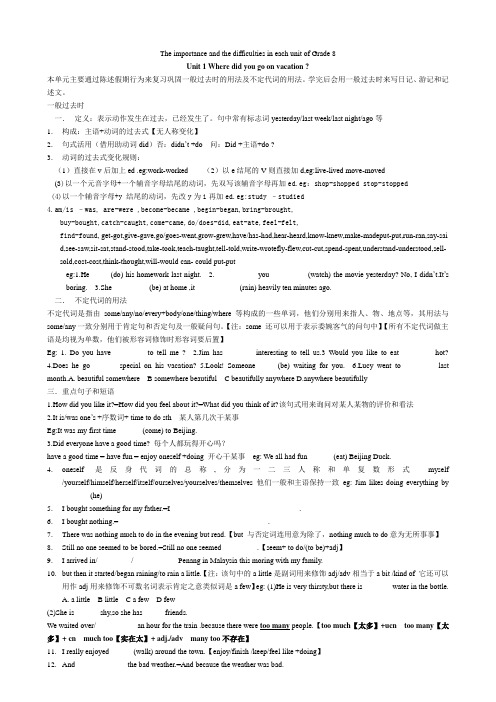
The importance and the difficulties in each unit of Grade 8Unit 1 Where did you go on vacation ?本单元主要通过陈述假期行为来复习巩固一般过去时的用法及不定代词的用法。
学完后会用一般过去时来写日记、游记和记述文。
一般过去时一.定义:表示动作发生在过去,已经发生了。
句中常有标志词yesterday/last week/last night/ago等1.构成:主语+动词的过去式【无人称变化】2.句式活用(借用助动词did)否:didn’t +do 问:Did +主语+do ?3.动词的过去式变化规则:(1)直接在v后加上ed .eg:work-worked (2)以e结尾的V则直接加d,eg:live-lived move-moved(3)以一个元音字母+一个辅音字母结尾的动词,先双写该辅音字母再加ed.eg:shop-shopped stop-stopped(4)以一个辅音字母+y 结尾的动词,先改y为i再加ed.eg:study –studied4.am/is –was, are-were ,become-became ,begin-began,bring-brought,buy-bought,catch-caught,come-came,do/does-did,eat-ate,feel-felt,find-found,get-got,give-gave,go/goes-went,grow-grew,have/has-had,hear-heard,know-knew,make-madeput-put,run-ran,say-sai d,see-saw,sit-sat,stand-stood,take-took,teach-taught,tell-told,write-wrotefly-flew,cut-cut,spend-spent,understand-understood,sell-sold,cost-cost,think-thought,will-would can- could put-puteg:1.He _____(do) his homework last night. 2.___________ you _________ (watch) the movie yesterday? No, I didn’t.It’s boring. 3.She _________ (be) at home ,it ___________ (rain) heavily ten minutes ago.二.不定代词的用法不定代词是指由some/any/no/every+body/one/thing/where等构成的一些单词,他们分别用来指人、物、地点等,其用法与some/any一致分别用于肯定句和否定句及一般疑问句。
新世纪版八年级上英语常用语法知识——非谓语动词(含答案解析)

一、选择题1.Alice always________her notebooks. She is not tidy.A.lose B.lost C.loses D.found C解析:C【解析】【分析】【详解】句意:爱丽丝总是搞丢笔记本。
她不整洁。
考查动词辨析、时态和主谓一致。
lose丢失,一般现在时;lost丢失,一般过去时;loses 丢失,一般现在时,第三人称单数;found发现,找到,一般过去时。
根据频度副词always,可知此句时态是一般现在时,排除B和D;本句主语Alice三单,可知谓语使用三单形式,故选C。
2.—How long can I _____ the English workbook? —For two weeks.A.borrow B.to borrow C.keep D.to keep C解析:C【解析】【分析】【详解】句意:——这本英语练习册我可以借多久?——两周。
考查动词的用法句中有情态动词may,所以此空应用动词原形,how long指时间段,和时间段连用要用延续动作动词,borrow的延续动作动词是keep,所以选C。
3.—Rose, can you give me a hand?—Just a minute. I ______ the followers.A.am watering B.have wateredC.watered D.water A解析:A【解析】【分析】【详解】句意:——Rose,你能帮我一下吗?——等一下,我正在浇花。
考查现在进行时。
根据语境:“Rose,你能帮我一下吗?”“等一下,我______花。
”可推测是正在浇花,所以用现在进行时。
故答案为A。
4.— How about going for a drive, Mike?— One moment, please! I __________ cleaning our room soon.A.will finish B.have finished C.finish D.finishes A解析:A【解析】【分析】【详解】句意:——迈克,开车出去兜兜风怎么样? ——请等一会,我会很快打扫完我们的房间。
上海牛津新世纪八年级上英语知识点汇总复习(U3)

上海⽜津新世纪⼋年级上英语知识点汇总复习(U3)Notes & Grammar of 8ANotes for Reading of Unit 31. deal with trouble1) deal with … : handle (处理,应付,对待) a problem or person;look after something and do what is necessary; deal – dealt – dealt(1) deal with sb. 对待/对付某⼈ e.g. He is naughty. Nobody knows how to deal with him.(2) deal with sth. 处理/应付问题e.g. Do you know how to deal with the trouble / the case?deal (n.) a great deal of +不可数名词⼤量的 e.g. a great deal of time ⼤量的时间(v.&n.) 交易,协议 e.g. We have done a deal with him. 我们已经和他做了⼀个协议/做⼀笔⽣意。
dealer n. 商⼈ a drug dealer 毒品贩⼦2) trouble : problem, difficulty or worry 问题;困难What’s the trouble / the matter / wrong with you?(be) in trouble 处于困难中have trouble (in) doing sth. 做某事有困难troublesome (adj.) ⿇烦的;困难的;讨厌的2. Paul is writing about an unusual thing which happened to him one day.保罗正在写(关于)某天发⽣在他⾝上的⼀件不同寻常的事情。
八年级英语上册知识点归纳总结
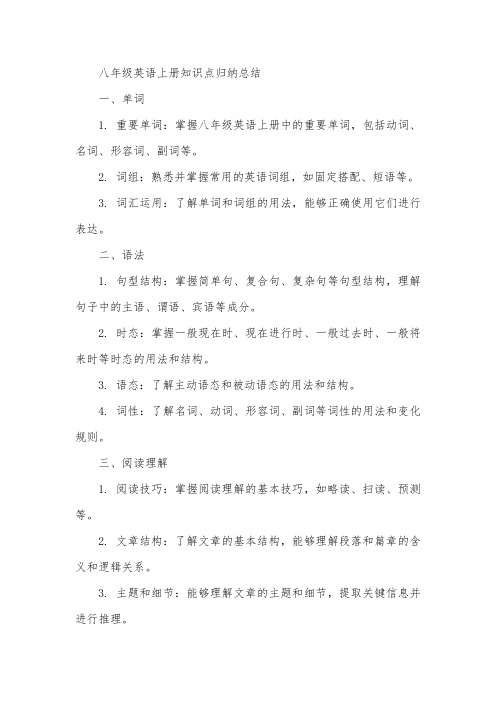
八年级英语上册知识点归纳总结一、单词1. 重要单词:掌握八年级英语上册中的重要单词,包括动词、名词、形容词、副词等。
2. 词组:熟悉并掌握常用的英语词组,如固定搭配、短语等。
3. 词汇运用:了解单词和词组的用法,能够正确使用它们进行表达。
二、语法1. 句型结构:掌握简单句、复合句、复杂句等句型结构,理解句子中的主语、谓语、宾语等成分。
2. 时态:掌握一般现在时、现在进行时、一般过去时、一般将来时等时态的用法和结构。
3. 语态:了解主动语态和被动语态的用法和结构。
4. 词性:了解名词、动词、形容词、副词等词性的用法和变化规则。
三、阅读理解1. 阅读技巧:掌握阅读理解的基本技巧,如略读、扫读、预测等。
2. 文章结构:了解文章的基本结构,能够理解段落和篇章的含义和逻辑关系。
3. 主题和细节:能够理解文章的主题和细节,提取关键信息并进行推理。
四、写作1. 写作技巧:掌握基本的写作技巧,如审题、构思、选词等。
2. 文章结构:了解文章的基本结构,能够运用段落和篇章组织文章。
3. 语言表达:能够运用所学词汇和语法知识进行表达,提高语言表达能力和准确性。
五、听力1. 听力技巧:掌握基本的听力技巧,如预览、预测、记录关键信息等。
2. 听力理解:能够听懂八年级英语上册中的对话和短文,理解其大意和细节。
3. 听力反应:能够快速反应并理解听力材料中的问题和指令,做出正确的选择和回答。
六、口语1. 口语表达:能够运用所学词汇和语法知识进行口语表达,提高口语表达能力和流利度。
2. 口语交际:了解常见的口语交际场合和交际方式,能够运用所学知识进行日常对话和交流。
3. 口语表达礼仪:了解并掌握基本的口语表达礼仪,如问候、道谢、道歉等。
新世纪版八年级上册英语第一单元知识点
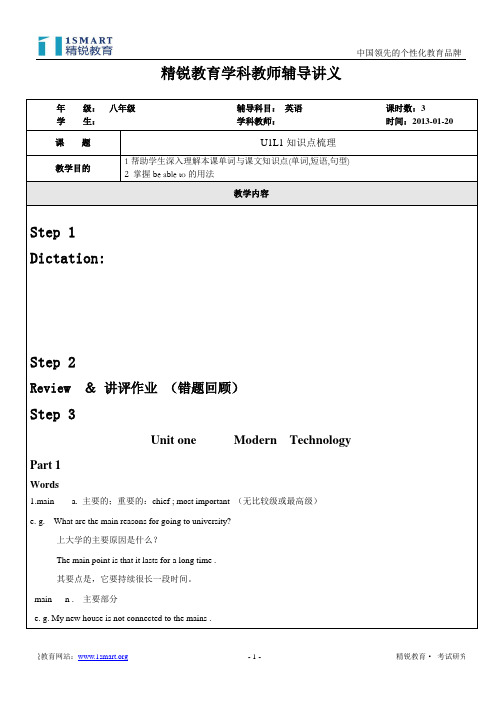
精锐教育学科教师辅导讲义年级:八年级辅导科目:英语课时数:3学生:学科教师:时间:2013-01-20课题U1L1知识点梳理教学目的1帮助学生深入理解本课单词与课文知识点(单词,短语,句型) 2 掌握be able to的用法教学内容Step 1Dictation:Step 2Review &讲评作业(错题回顾)Step 3Unit one Modern Technology Part 1Words1.main a. 主要的;重要的:chief ; most important (无比较级或最高级)e. g. What are the main reasons for going to university?上大学的主要原因是什么?The main point is that it lasts for a long time .其要点是,它要持续很长一段时间。
main n . 主要部分e. g. My new house is not connected to the mains .我的新房子(的水电)还没有接上干线。
词组:the main point 要点 in the main 总的来说 main unit (计算机的)主机派生词:Mainly ad. 主要地;大部分:chiefly ; for the most partThe spacious main bedroom is mainly blue.宽敞的主卧室以蓝色为主色调。
2. unit n.单位,单元;装置;个体;[数]单位数复数:unitse. g.) This unit is a little bit hard.这个单元有点难。
The family is a social unit.家庭是一个社会单元。
What unit are you with?你是哪个部队的?3. Monitor n .复数:monitors第三人称单数:monitors过去式:monitored过去分词:monitored现在分词:monitoring(1) n.显示屏,屏幕;[计]显示器;监测仪e. g. The heart monitor shows low levels of consciousness.心脏监测器显示患者神志不清。
新世纪英语八年级上YLE
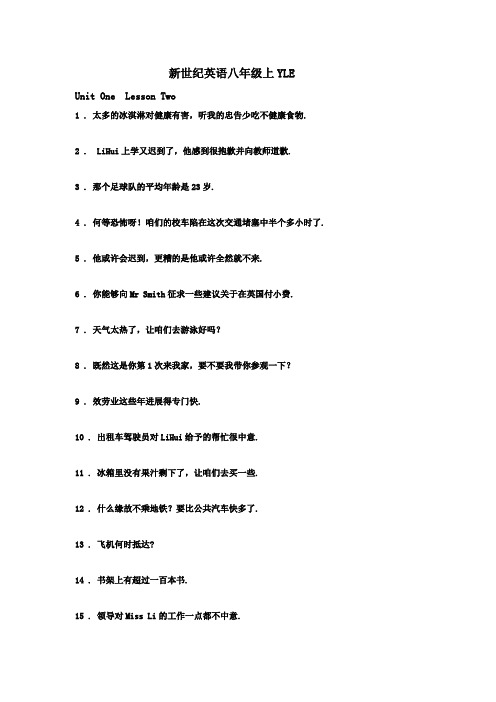
新世纪英语八年级上YLEUnit One Lesson Two1 . 太多的冰淇淋对健康有害,听我的忠告少吃不健康食物.2 . LiHui上学又迟到了,他感到很抱歉并向教师道歉.3 . 那个足球队的平均年龄是23岁.4 . 何等恐怖呀!咱们的校车陷在这次交通堵塞中半个多小时了.5 . 他或许会迟到,更糟的是他或许全然就不来.6 . 你能够向Mr Smith征求一些建议关于在英国付小费.7 . 天气太热了,让咱们去游泳好吗?8 . 既然这是你第1次来我家,要不要我带你参观一下?9 . 效劳业这些年进展得专门快.10 . 出租车驾驶员对LiHui给予的帮忙很中意.11 . 冰箱里没有果汁剩下了,让咱们去买一些.12 . 什么缘故不乘地铁?要比公共汽车快多了.13 . 飞机何时抵达?14 . 书架上有超过一百本书.15 . 领导对Miss Li的工作一点都不中意.16 . Mr Black给了咱们一些关于英语学习的建议.17 . 谢谢你的礼物,它看上去很漂亮 .18 . 作为一名学生,你应该尽力成为一名老实的人 .19 . 五班的学生在圣诞日举行了一个舞会 .20 . 火鸡味道尝起来,比鸡肉味道好多了.21 . 我必需今天交作业吗?恐怕是的 .22 . 你应当为敲碎了玻璃窗向Mrs Green道歉 .23 . 若是你花更多的时刻在你的英语上,你将学得更好 .24 . 咱们多快乐呀!因为下礼拜六咱们参观上海大剧院 .25 . The Smiths在看电视,当有人敲门的时候 .26 . 电影十分钟内将播放,假设Wei Fang不快点,她将迟到 .27 . 自1990年以来,上海变了很多 .28 . 你父亲何时前去北京的?上周一 .29 . 很少有人明白他的故事 .30 . 那个女效劳员希望我能给她多一点小费 .31 . 动身早一点,你就可不能错过这班火车 .32 . 你应当给出租车驾驶员至少10%的小费 .Unit One Lesson Two1 . 太多的冰淇淋对健康有害,听我的忠告少吃不健康食物 .Too much ice-cream is bad foe your health. Take my tip and eat less junk food .2 . LiHui上学又迟到了,他感到很抱歉并向教师道歉 .Li Hui was late for school again. He felt very sorry and apologized to the teacher.3 . 那个足球队的平均年龄是23岁 .The average age of that football team is 23 years old.4 . 何等恐怖呀!咱们的校车陷在这次交通堵塞中半个多小时了 .How terrible! Our school bus was stuck in the traffic jam for more than half an hour.5 . 他或许会迟到,更糟的是他或许全然就不来 .He may be late. Worse still, he may not come at all.6 . 你能够向Mr Smith征求一些建议关于在英国付小费 .You can ask Mr Smith for some advice about tipping in Britain.7 . 天气太热了,让咱们去游泳好吗?It’s terribly hot . Let’s go swimming , shall we?8 . 既然这是你第1次来我家,要不要我带你参观一下?Since it was your first visit to my family , shall I show you around our house?9 . 效劳业这些年进展得专门快 .Telephone services are developing very quickly these years.10 . 出租车驾驶员对LiHui给予的帮忙很中意 .The taxi driver was very pleased with Li Hui’s help.11 . 冰箱里没有果汁剩下了,让咱们去买一些 .There is little juice left in the fridge . Let’s go and buy some .12 . 什么缘故不乘地铁?要比公共汽车快多了 .Why not take the undergroud ? It’s much quicker than the bus .13 . 飞机何时抵达 ?When will the plane arrive , do you know ?14 . 书架上有超过一百本书 .There’s more than one hundred books on the shelf .15 . 领导对Miss Li的工作一点都不中意 .The manager wasn’t pleased with Lee’s work at all .16 . Mr Black给了咱们一些关于英语学习的建议 .Mr Black gave us some advice about English learning .17 . 谢谢你的礼物,它看上去很漂亮 .Thank you for your present . It looks beautiful .18 . 作为一名学生,你应该尽力成为一名老实的人 .As a student , you should try to be an honest person .19 . 五班的学生在圣诞日举行了一个舞会 .The students of Class Five held a dance party on Christmas Day .20 . 火鸡味道尝起来,比鸡肉味道好多了 .The turkey tases much better the chicken .21 . 我必需今天交作业吗?恐怕是的 .– Must I hand in my homework today ? - I’m afraid you must .22 . 你应当为敲碎了玻璃窗向Mrs Green道歉 .You should apologize to Mrs Green for breaking her window .23 . 若是你花更多的时刻在你的英语上,你将学得更好 .If you spend a little more time on your English , you’ll learn it better .24 . 咱们多快乐呀!因为下礼拜六咱们参观上海大剧院 .How happy we are to visit Shanghai Grand Theatre next Saturday !25 . The Smiths在看电视,当有人敲门的时候 .The Smiths were watchingTV when someone knocked at the door.26 . 电影十分钟内将播放,假设Wei Fang不快点,她将迟到 .The film will be on in ten minutes. If Wei Fang doesn’t hurry , she will be late.27 . 自1990年以来,上海变了很多 .Shanghai has changed a lot since 1990.28 . 你父亲何时前去北京的?上周一 .–When did your father leave for Beijing ? -Last Monday.29 . 很少有人明白他的故事 .Few people know his story.30 . 那个女效劳员希望我能给她多一点小费 .The waitress hoped that I would leave her a bigger tip.31 . 动身早一点,你就可不能错过这班火车 .Start early, and you won’t miss the train.32 . 你应当给出租车驾驶员至少10%的小费 .You ought to tip the taxi driver at least 10 per cent of the fare .Unit One Lesson Three1 . 效劳员让咱们看了一会菜单,然后请咱们点菜。
八年级英语上(新世纪版)U4强化—since引导的时间状语从句—阅读—听力—作文

⼋年级英语上(新世纪版)U4强化—since引导的时间状语从句—阅读—听⼒—作⽂1. since引导的时间状语从句1.since引导的时间状语从句,此⽤法较复杂。
1)若since引导的状语从句的谓语动词是瞬间动词的过去时,则从句表⽰的时间是“从该动作开始的那⼀刻起”。
这是最常见的⼀种⽤法。
E.g.He has studied very hard _________(⾃从)he came to our school.2)若since引导的状语从句的位于动词是延续性动词或表⽰状态的静态动词的过去时,则从句表⽰的时间是“从该动作或状态的完成或结束时算起。
E.g.I haven’t heard from him since he lived here.3)若since引导的状语从句的位于未延续性动词的现在完成时,则表⽰动作和状态延续到现在,其表⽰的时间的起点应从动词发⽣之时起。
4)It is+⼀段时间+since.../It has been +⼀段时间+since...表⽰,“从……起已有多长时间了”,⽤法:since从句中常⽤⼀般过去时,若从句中是延续性动词的⼀般过去时,则表⽰该动作结束有多长时间。
E.g.It is three years since he smoked.PracticeI.Fill in the blanks with ‘since’ or ‘for’.1.He has lived in Nanjing ________ the year before last.2.I’ve known him ________ we were children.3.Our teacher has studied Japanese ________ three years.4.She has been away from the city _______ about ten years.5.It’s about ten years ________ she left the city.II.Choose the best answer.1.I’ve been like this ever since ________./doc/1d85d421a48da0116c175f0e7cd184254a351bf4.html st weekB.for a weekC.a week beforeD.the last week2.My mother has worked in this factory ________ 2 years.A.aboutB.forC.inD.since3.I haven’t heard from him _______ last week.A.beforeB.forC.agoD.since4.His father joined the party _______.A.for three yearsB.since three years agoC.three years agoD.in two years’ time5.How long _______ he ________ the library book.A.has, borrowB.has, keptC.has, boughtD.did, buyIII.Translate Chinese into English.1.⾃从他搬到北京,他就住在那个⼩区了。
新世纪英语八年级第一学期知识点
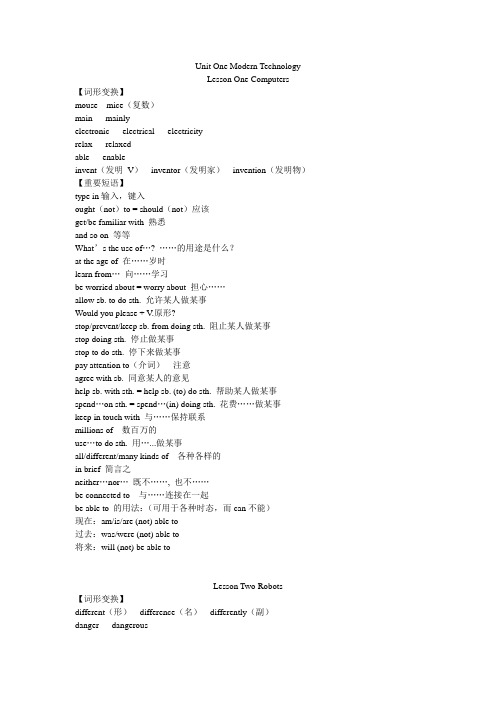
Unit One Modern TechnologyLesson One Computers 【词形变换】mouse---mice(复数)main --- mainlyelectronic --- electrical --- electricityrelax --- relaxedable --- enableinvent(发明V)---inventor(发明家)---invention(发明物)【重要短语】type in输入,键入ought(not)to = should(not)应该get/be familiar with 熟悉and so on 等等What’s the use of…? ……的用途是什么?at the age of 在……岁时learn from…向……学习be worried about = worry about 担心……allow sb. to do sth. 允许某人做某事Would you please + V.原形?stop/prevent/keep sb. from doing sth. 阻止某人做某事stop doing sth. 停止做某事stop to do sth. 停下来做某事pay attention to(介词)注意agree with sb. 同意某人的意见help sb. with sth. = help sb. (to) do sth. 帮助某人做某事spend…on sth. = spend…(in) doing sth. 花费……做某事keep in touch with 与……保持联系millions of 数百万的use…to do sth. 用…...做某事all/different/many kinds of 各种各样的in brief 简言之neither…nor…既不……, 也不……be connected to 与……连接在一起be able to 的用法:(可用于各种时态,而can不能)现在:am/is/are (not) able to过去:was/were (not) able to将来:will (not) be able toLesson Two Robots【词形变换】different(形)---difference(名)---differently(副)danger --- dangerousoperate --- operationmemory --- memorizeindustry --- industrialmedicine --- medicalplease---pleasure(名)---pleased(形人)---pleasant(形物)【重要短语】tidy up 整理,收拾make the bed 铺床perform/do an operation on sb. 给某人做手术perform/do operations on sb. = operate on sb. be different from与……不同be the same as与……相同know nothing about 对……一无所知with pleasure 高兴地,快乐地;乐意地what else = what other things (else常放在不定代词和疑问词的后面)decide to do sth. 决定做某事practise doing sth. 练习做某事not only…but also…不但……而且……not…any more/longer = no more/longer不再keep doing sth. 一直不停地做某事be afraid of sth./doing sth. 害怕某物/做某事be afraid to do sth. 害怕做某事with/without the help of 在……的帮助下/ 没有……的帮助不定代词的用法:something 常用于肯定句中,也可用于希望得到对方肯定回答的疑问句中anything 常用于否定句或疑问句中nothing 常用于否定句中(what)everything上述不定代词都指物,不能和of连用,都是单数。
八年级英语上(新世纪版)期中复习(1)—U1-U4知识点梳理—阅读综合—应用文作文2篇
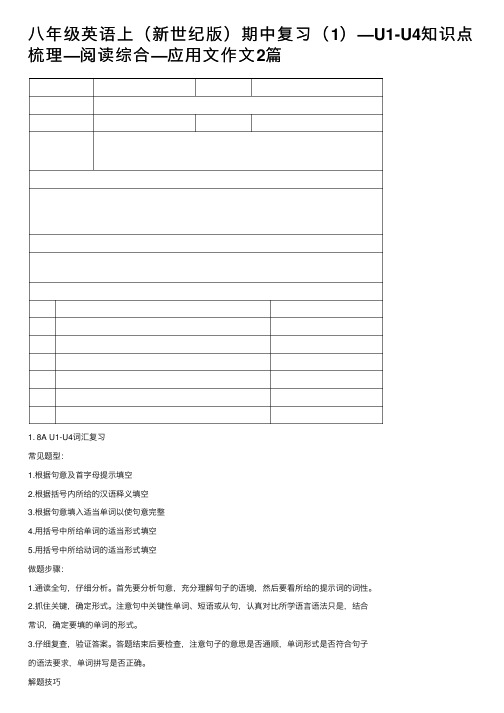
⼋年级英语上(新世纪版)期中复习(1)—U1-U4知识点梳理—阅读综合—应⽤⽂作⽂2篇1. 8A U1-U4词汇复习常见题型:1.根据句意及⾸字母提⽰填空2.根据括号内所给的汉语释义填空3.根据句意填⼊适当单词以使句意完整4.⽤括号中所给单词的适当形式填空5.⽤括号中所给动词的适当形式填空做题步骤:1.通读全句,仔细分析。
⾸先要分析句意,充分理解句⼦的语境,然后要看所给的提⽰词的词性。
2.抓住关键,确定形式。
注意句中关键性单词、短语或从句,认真对⽐所学语⾔语法只是,结合常识,确定要填的单词的形式。
3.仔细复查,验证答案。
答题结束后要检查,注意句⼦的意思是否通顺,单词形式是否符合句⼦的语法要求,单词拼写是否正确。
解题技巧1.从句意找单词认真阅读所给的句⼦和括号内所给的单词,从句⼦的主体意思或关键信息来判断⽤哪⼀个单词,要根据句意选择恰当的单词。
2.根据句⼦成分判断所填单词根据单词在句⼦中的成分或句法功能判断要填的单词的词性。
名词要注意其单复数、是否可数、是否⽤所有格;动词要注意⼈称、数、时态语态和⾮谓语形式,修饰名词代词⽤形容词;修饰形容词、副词⽤副词等。
3.根据关键词判断动词的时态如果句⼦中有⽐较明显的时间状语,可以根据不⽤的时间状语来判断动词的不同时态。
4.从主语和谓语的关系来判断语态如果句⼦的主语是后⾯动词所表⽰动作的执⾏者,⽤主动语态;如果句⼦的主语不能执⾏后⾯动词所表⽰的动作,⽽是动作的承受者,⽤被动语态。
PracticeI. Complete the sentences with the given words in their proper forms. (⽤所给单词的适当形式完成下列句⼦)1.The people in the street are ___________ tourists. (main)2.Mr. Green, an __________ engineer, bought an _________ fan yesterday. (electronic)3.The computer _________ us to do a better job. (able)4.I was _________ to ride to school because my bicycle was broken. (able)5.There were a lot of __________ in that old house. (mouse)6.Linda, ________ of our class, can speak very good English. (monitor)7.Who was the __________ of the television? (invent)8.Could you tell me some other _________ besides high price? (advantage)9.Listening to music makes me very __________. (relax)10.No one is _________ to smoke in public places. (allow)11.The computer is not _________ to the Internet. (connect)12.You have answered the question _________.(correct)13.I noticed an _________ answer on my test paper. (correct)14.My father likes playing football for __________. (funny)15.His _________ to speak English fluently made him find a good job. (able)16.Some websites are _________ for students-to-study. (use)17.The new technology has brought us a lot of _________. (convenient)18.Your room looks __________. You’d better clean it at once. (tidy)19.They are making __________ for the sports meeting. (prepare)20.I’m really _________ with the __________ weather here. (please)robot memorize different industry medicine21.Are there any _________ between robots and ordinary machines?22.Tim has a good _________ and he can recite the text quickly.23._________ robots can work in very hot places.24._________ scientists have developed many kinds of robots.25. A _________ examination is necessary before joining the army.26.He works _________ in his company.27.It is bad for health to work in such a __________ place.28.The __________ were so wonderful that I enjoyed them very much.29.You need more ___________ if you want to speak English well.30.After the car accident, the poor young man completely lost his _________.31.Could you tell me the ___________ between a digital TV and an ordinary one?32.The new technology makes our lives both easier and more _________.33.We should teach the students how to get the information from the passage ________ and quickly.34.Their teacher is trying her best to get _________ with the new textbook.35.Household appliances ___________ people to enjoy more free time.36.What a _________ trip we had!37.Please help ___________ to some fish, everyone.38.What is the difference between Chinese and _________ culture and customs?39.When I got home yesterday, my mother was busy __________ for our supper.40.The teacher was __________ with the boy’s answer and smiled.polite custom invite paint tradition41.The sushi for the potluck party looks __________.42.There are many __________ in the shop at weekends.43.Dragon Boat Festival is our __________ festival.44.“Please take my seat, Granny.”The girl said __________.45.He is such a good _________ that many people like his _________.46.The Whites are busy __________ their flat. (renovate)47.The host opened the present in front of these _________. (visit)48.Nowadays _________ with each other is very important. (communicate)49.It’s __________ for a child to eat and sleep well. (need)50.Spring Festival is our ___________ festival. (tradition)51.Many foreigners like paper __________. (cut)52.The People’s Square is ___________ in the center of Shanghai. (locate)53.Here are some ___________ for you. (invite)HomeworkI. Complete the sentences with the given words in their proper forms. (⽤所给单词的适当形式完成下列句⼦)1.Today is the first day of the new term. Our teacher let us introduce __________ in class. (we)2.He has been to __________ twice. (English)3.Uncle Li is a __________ in a Chinese restaurant. (cooker)4.Grandma is __________ ill and she’s in hospital now. (terrible)5.It was the best known and __________ the most popular of her songs. (probable)6.At the age of 13, Bill Gates was already the __________ of a computer company. (own)7.My new flat is on the __________ floor of that building. (twelve)8.His ambition is to be an __________. (engine)9.His English is __________ than any other student in his class. (best)10.Is reading _________ to English study? (help)11.The building is 10 meters in __________. (high)12.His mother is __________ than I think. (friend)13.It’s about fifteen __________ walk from my home to school. (minute)14.You must drive as ___________ as possible. (safe)15.It’s such an __________ film that all of us enjoy it. (interest)16.Teacher’s Day comes at the __________ of the new term. (begin)17.Sony, Ford and Coca-Cola are three big __________. (business)18.At last, I tried my best to work out the problem __________. ( success)19.I am my class teacher’s __________. (assist)20.My grandparents go to the park __________ a week. (two)21.__________, the police came to help them right away.22.What a __________ lesson this is!23.Most of the boys in our class enjoy playing football. I think it helps them stay much __________.24.The girl from __________ is a famous singer.25.We had a warm ___________ about our trip three days ago.26.__________, we caught the bus.27.Tom will come back on the ___________ of next month.28.The monkey looked at ___________ in the mirror.29.I have a friend called Tom. He __________ from France.30.I am glad to see that you look __________ than before.31.Children are always __________ to watch TV after school.32.Everyone can achieve __________ in his field if he works hard.33. A lot of __________ have happened in this area recently.34.It was __________ for Jim to get to school late this morning.35.The babies are sleeping. Please leave the room __________.crowd rob care argue fun/doc/71e685e3974bcf84b9d528ea81c758f5f71f29f7.html st night my father told me a very __________ story.37.Every morning the buses are ___________ with students.38.You must be __________ when you cross the street.39.There was a big __________ on the street.40.The police caught the two __________ at last.begin danger argue one shop41.Most women enjoy __________.42.It’s very __________ to cross a busy street.43.He doesn’t want to hear any __________ between his parents.44.That was the __________ of my troubles.45.Do you know who was the __________ to come to school yesterday morning?power invent hurry develop worry46.Tom went to the bus-stop ___________.47.My parents are always __________ about me.48.The sport car has a very __________ engine.49.China is a __________ country.50.Edison is one of the most famous __________ in the world.2.U1-U4句型转换复习句型转换解题技巧句型转换不仅测试学⽣对英语语法基础知识和技能,如词汇、时态、句⼦成分、句⼦种类、句⼦结构等的掌握情况,⽽且测试学⽣⽤不同的语⾔⽅式表达相同或相近意思的能⼒。
八上英语一二单元知识点汇总
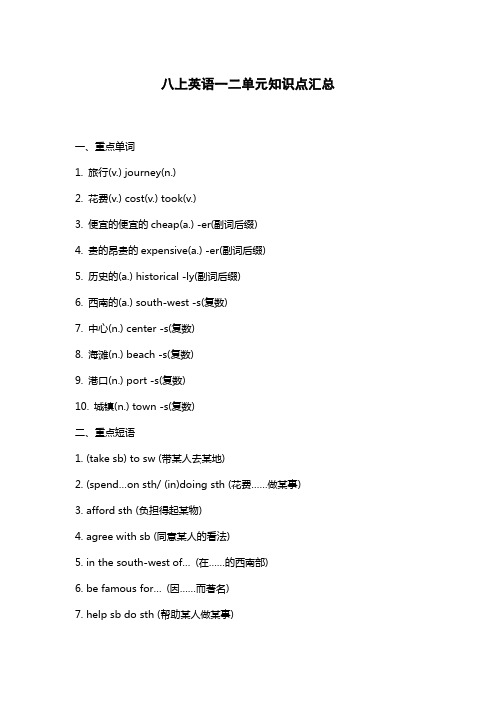
八上英语一二单元知识点汇总一、重点单词1. 旅行(v.) journey(n.)2. 花费(v.) cost(v.) took(v.)3. 便宜的便宜的cheap(a.) -er(副词后缀)4. 贵的昂贵的expensive(a.) -er(副词后缀)5. 历史的(a.) historical -ly(副词后缀)6. 西南的(a.) south-west -s(复数)7. 中心(n.) center -s(复数)8. 海滩(n.) beach -s(复数)9. 港口(n.) port -s(复数)10. 城镇(n.) town -s(复数)二、重点短语1. (take sb) to sw (带某人去某地)2. (spend…on sth/ (in)doing sth (花费……做某事)3. afford sth (负担得起某物)4. agree with sb (同意某人的看法)5. in the south-west of…(在……的西南部)6. be famous for…(因……而著名)7. help sb do sth (帮助某人做某事)8. feel+形容词(宾语从句) (感觉到某事物)9. a place where+从句(一个……的地方)10. as+adj.+as possible (尽可能……地)三、重点句型1. It is +adj+for sb+to do sth 对某人来说做某事……的。
2. What+adj+名词+主语+be? ……怎么样?3. How+adj/adv+主语+be? ……怎么样?4. There are many different kinds of/places…(有很多不同种类的/地方……)5. I’m sure/I believe that…(我相信……)6. Would you like to do sth? (你愿意做某事吗?)。
- 1、下载文档前请自行甄别文档内容的完整性,平台不提供额外的编辑、内容补充、找答案等附加服务。
- 2、"仅部分预览"的文档,不可在线预览部分如存在完整性等问题,可反馈申请退款(可完整预览的文档不适用该条件!)。
- 3、如文档侵犯您的权益,请联系客服反馈,我们会尽快为您处理(人工客服工作时间:9:00-18:30)。
新世纪8年级上册4个单元英语知识点整理Unit One Modern Technology Lesson One Computers【词形变换】mouse---mice(复数)main --- mainlyelectronic --- electrical --- electricityrelax --- relaxedable --- enableinvent(发明v.)---inventor(发明家)---invention(发明物)【重要短语】type in输入,键入ought(not)to = should(not)应该get/be familiar with 熟悉and so on 等等What’s the use of…? ……的用途是什么?at the age of 在……岁时learn from… 向……学习be worried about = worry about 担心……allow sb. to do sth. 允许某人做某事Would you please + v.原形?stop/prevent/keep sb. from doing sth. 阻止某人做某事stop doing sth. 停止做某事stop to do sth. 停下来做某事pay attention to(介词)注意agree with sb. 同意某人的意见help sb. with sth. = help sb. (to) do sth. 帮助某人做某事spend…on sth. = spend…(in) doing sth. 花费……做某事keep in touch with 与……保持联系millions of 数百万的use…to do sth. 用…...做某事all/different/many kinds of 各种各样的in brief 简言之neither…nor… 既不……, 也不……be connected to 与……连接在一起be able to 的用法:(可用于各种时态,而can不能)现在:am/is/are (not) able towas/were (not) able towill (not) be able toLesson Two Robots(形)---difference(名)---differently(副)(名)---pleased(形/人)---pleasant(形/物)整理,收拾铺床给某人做手术与……不同be the same as与……对……一无所知高兴地,快乐地;乐意地else常放在不定代词和疑问词的后面)决定做某事练习做某事不但……而且……不再一直不停地做某事害怕某物/做某事be afraid to do sth. 害怕做某事在……的帮助下/ 没有……的帮助something 常用于肯定句中,也可用于希望得到对方肯定回答的疑问句中anything 常用于否定句或疑问句中nothing 常用于否定句中(what)everything上述不定代词都指物,不能和of连用,都是单数。
someone = somebody 常用于肯定句中anyone = anybody 常用于否定或疑问句中no one = nobody 常用于否定句中(who)everyone = everybody上述不定代词都指人,不能和of连用,也都是单数。
none既可指人也可指物,既可用作单数也可用作复数,常和of连用。
(how many)Lesson Three Household Appliances【词形变换】clean --- cleanerapply --- appliance【重要短语】move into/to 搬进/到be made in 在……制造be made of 由……制成(可看出原材料)be made from由……制成(看不出原材料)turn on/off 打开/ 关闭turn up/down 调高/ 调低finish doing sth. 结束做某事What’s that button for? 那个按钮是干什么的?a piece of cake 容易的事情enjoy oneself = have a good time = have fun 玩得愉快by hand 手工;手动It takes sb. some time to do sth. 做某事花费某人……时间in addition 此外;加之enable sb. to do sth. 能使某人做某事at the same time 同时both…and… ……和……都way of life 生活方式语法:感叹句How + adj./adv. + 主语+ 谓语!e.g. How interesting the book is!What + 名词短语+ 主语+ 谓语!e.g. What an interesting book it is!What + a/an + adj. + n.(单数名词)+ 主语+ 谓语!只供学习与交流e.g. What a lovely girl she is!What + adj. + n.(复数名词或不可数名词)+ 主语+ 谓语!e.g. What bad weather it is! What beautiful flowers they are!=======================================Unit Two Culture and CustomsLesson One Visiting a British Family【词形变换】culture --- culturalcustom --- customerpaint --- paintinglove --- lover --- lovelyplease --- pleased --- pleasant --- pleasure【重要短语】try(it)on 试穿shake hands with 和……握手put up 张贴,举起put on 穿上put out 熄灭,扑灭sitting room 起居室be one’s first to do sth. 某人第一次做某事show sb. around sp. 带领某人参观某地for the first time 第一次advise sb. to do sth. 建议某人做某事a group of 一群be busy doing sth. = be busy with sth. 忙于做某事in response to 作为对……的答复;作为对……的反应Chinese painting 国画English-speaking 说英语的learn to do sth. 学习做某事something to drink 一些喝的东西on a study trip 进行一次学习旅行since引导的原因状语从句(主句现在完成时,从句一般过去时)e.g.Lesson Two Eating Out【词形变换】start --- starterwait --- waiter --- waitresssure --- surelynoise --- noisy --- noisilyhard --- hardly【重要短语】eat out 吃完have been to 去过have gone to 去了return to… 返回invite sb. to do sth. 邀请某人做某事invite sb. to… 邀请某人去few(否) a few(肯)修饰可数名词复数little(否) a little(肯)修饰不可数名词by the way 顺便问一下need to do sth. 需要做某事ask for… 寻求What do you think of…? = How do you like…?你觉得怎么样?be for 赞成be against 反对on weekdays 在工作日at weekends 在周末be fond of 喜欢such as 例如,诸如……之类first of all = at first 首先in addition 此外what’s more 而且main course 主菜take sb.’s order 记录某人点的菜go Dutch 各人付各人的帐service charge 服务费be true for 对……适用,符合于so…that (中间接形容词或副词原级)----引导的结果状语从句such…that (中间接名词短语)“如此……,以致……”=========================================Unit Three Knowledge of Common InterestLesson One Idioms with Body Parts【词形变换】attention --- attentive --- attentivelymean --- meaning --- meaningful --- meaninglesslisten --- listenerloud --- loudly --- aloud【重要短语】You’ve got a sweet tooth. 你喜欢吃甜食。
I see eye to eye with you. 我与你的看法完全一致。
He’s got a green thumb. 他园艺技能高超。
He’s all ears. 他全神贯注地听。
You’ve just hit the nail on the head.你正好击中要害(一针见血)。
You should stand on your own feet.(You should be independent.)He’s pulling your leg.(He’s kidding.)It will cost an arm and a leg.(It will cost a lot.)I’m all thumbs.(I’m clumsy.)She’s got him under her thumb.(She controls him.)be good at 擅长= do well inwith the help of 在……的帮助下,借助于……teach sb. sth. 教某人某事(宾格)teach sb. to do sth. 教某人做某事teach oneself = learn…by heart 自学the way to… 去……的路be quiet = keep quiet 保持安静on the other hand 另一方面be careful = look out = take care 小心,当心never mind 没关系,不要紧by heart 靠记忆as soon as引导的时间状语从句(主句将来时,从句一般现在时)e.g.只供学习与交流Lesson Two Exhibitions and Museums【词形变换】exhibit --- exhibitionprice --- pricelessenter --- entranceeconomy --- economicproud --- prideproduce --- product --- production【重要短语】wait for sb. 等待某人It is(has been)+ 一段时间+ since + 句子(一般过去时)“自从……以来,已经有……的时间了。
